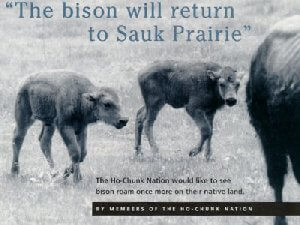by Members of the Ho-Chunk Nation
 The aboriginal territory of the Ho-Chunk people, formerly known as the Wisconsin Winnebago Tribe, once covered several million acres and extended throughout southern Wisconsin and northern Illinois. Long before the arrival of European Americans, the Ho-Chunk people
The aboriginal territory of the Ho-Chunk people, formerly known as the Wisconsin Winnebago Tribe, once covered several million acres and extended throughout southern Wisconsin and northern Illinois. Long before the arrival of European Americans, the Ho-Chunk people
inhabited Sauk Prairie, the fourteen hundred acres situated between
the Baraboo Bluffs and the Wisconsin River. Ho-Chunk villages on
Sauk Prairie were surrounded by a variety of wildlife, including elk, bison,
moose, lynx, bear, and wolves. As European immigrants moved west,
Ho-Chunks were forcibly removed through treaties with the United States
government, and the habitat for the abundant wildlife became farmland.
A major portion of Sauk Prairie was turned into the Badger Army
Ammunition Plant in 1942, creating an industrial center where once
prairie grasses had swayed in the wind. After almost twenty-five years
of inactivity, the federal government has now declared Badger Army
Ammunition Plant “surplus.” Negotiations are underway with the state
of Wisconsin, the Ho-Chunk Nation, local communities, and conservation
groups for the transfer of the land for non-industrial uses and to
remediate the existing environmental contamination.
The Ho-Chunk Nation is working cooperatively with federal, state and
local officials and groups to acquire a portion of the land comprising
the Badger Army Ammunition Plant with the intent of reintroducing bison
and restoring prairie grasses – plans compatible with those of many
local groups and neighboring property owners.
The Ho-Chunk Nation is committed to protecting and enhancing natural
resources on the Nation’s lands. Several years ago, the Nation acquired
a 639-acre farm comprised of ancestral land along the Wisconsin River
near Muscoda in Richland County, the site of the remnants of an
important mound group. After the farm was purchased, the Nation
investigated several uses for the property. The high rate of diabetes
and heart disease among Tribal members led to research on the health
benefits of a natural diet, one more closely resembling the diet of
Ho-Chunk ancestors.
The desire to substitute buffalo meat for beef led to the Nation’s
involvement with the InterTribal Bison Cooperative, a nonprofit venture
whose goal is to help Indian tribes establish their own bison herds.
Today, the Ho-Chunk Nation’s Muscoda Bison Ranch and Farm is home to
eighty-three bison,* and bison meat is served regularly at traditional
feasts as well as at the Nation’s elder meal sites in Black River Falls,
Tomah, Wisconsin Dells, Nekoosa, and Wittenberg.
Shortly after the Muscoda property was acquired, the Ho-Chunk Nation
joined the Bureau of Indian Affairs’ Circle of Flight Program, enabling
the Nation to operate resource management programs, including the
restoration of approximately one hundred acres of the Muscoda land to
natural prairie. In addition, the Nation works to provide quality
forage for grazing by the Tribe’s bison and to improve the native
habitat.
The Nation’s demand for bison meat has outgrown the capacity of the
Muscoda land. Given recent trends in the health consciousness of
consumers, the Nation is also considering selling this healthier source
of protein to the general public as a means of economic diversification.
In order to maintain a healthy breeding environment without overgrazing
the land (recommended at a minimum of four acres of land per animal),
the Nation would like to acquire another large contiguous parcel of land
that will allow for herd expansion.
Though the Nation does not intend to place bison there, a model program
for the Ho-Chunk Nation’s cooperation with government and private groups
is currently underway at the former La Farge Dam site in Vernon County,
Wisconsin. The Kickapoo Valley Reserve, covering approximately 8,500
acres, is a nature reserve jointly owned and managed by the state of
Wisconsin through the Kickapoo Reserve Management Board and the Ho-Chunk
Nation.
Being a good neighbor is an important part of the Ho-Chunk Nation’s
philosophy – a commitment to working cooperatively with our neighbors
for the greater good that stems from traditional teachings of honor and
respect for all the creatures of Mother Earth. Every part of the earth
is sacred to the Ho-Chunk people – from the smallest humming insect to
the great bald eagle, from the little babbling brook to the mighty
Mississippi, from the sandy shore to the majestic bluff, we are all
brothers and sisters. And such, it is our inherent duty to protect the
environment – clean air, clean groundwater, and healthy ecological
systems.
Every venture the Ho-Chunk Nation undertakes has one primary objective –
to improve the lives of our people. After decades of physical and
spiritual impoverishment, the Ho-Chunk Nation now has an opportunity to
be a good neighbor while at the same time promoting the physical health
of our people, preserving a significant part of our history,
revitalizing our cultural heritage, renewing our spirit, and restoring
the ecology of part our ancestral home in Sauk Prairie. The Ho-Chunk
Nation looks forward to the day when we can say with certainty and
pride: “The bison will return to Sauk Prairie.”
*The current herd count as of March, 2001 is 125.

